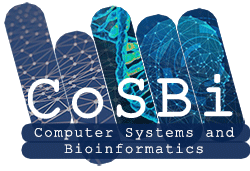Trustworthy AI-driven next generation precision medicine in COVID-19
Background
The COVID-19 pandemic has caused millions of cases and deaths and the AI-related scientific community, after being involved with detecting COVID-19 signs in medical images, has been now directing the efforts towards the development of methods for risk factor analysis to predict the progression of the disease. Advancements in artificial intelligence (AI), deep learning (DL) included, should make significant contributions in this area: however, most of the DL models consider only clinical information or image-based data and, to the best of our knowledge, few work has investigated the fusion between patient digital phenotypes extracted from radiology imaging and multivariate clinical data.
Goals
The project aims to advance multimodal DL (MDL), an area of great interest at its infancy, addressing issues currently opened: it studies shared and powerful data representations, optimal fusion architecture, multimodal regularization, learning with missing data and modalities. It also explores explainable AI methods for MDL using attention and counterfactual mechanisms, generating textual and visual explanations and human-understandable concepts, a topic still not addressed in the literature. These explanations will help physicians, patients, and regulators to trust the output of the AI models, also understanding which the risk factors are and why they carry useful information to predict the prognosis.
On a cohort of patient datasets publicly available in the literature, including chest X-ray (CXR) and chest computed tomography (CCT) scans as well as clinical information, using our MDL-based risk analysis method will determine a signature, i.e., a clear and concise set of quantitative biomarkers, to identify patients at risk of severe outcomes. This signature, feeding AI-based decision support systems, will offer the possibility to select the right therapy for the right patient.
Objectives
This project addresses healthcare-related and technical research questions. The former look for digital-based and multimodal signatures for the risk of severe outcome in patients affected by COVID-19. While a large part of the AI-based efforts has dealt with the detection of COVID-19 pneumonia, only few researchers have proposed AI-based methods to predict the outcome and, among them, only 4 exploit the richness offered by multimodal data.
In this respect, the technical AI-related questions studied in this project are:
- how to build multimodal representations by multimodal deep learning;
- how to build multimodal representations by multimodal deep learning;
- making available models able to explain the reasons for the behavior of AI paradigms, producing insights about the causes of their decisions;
- how to perform robust validation.
The bilateral collaboration is important to reinforce the interactions between the partners that are well-recognized international players in biomedical and AI research. Indeed, Italian unit will offer its skills in multimodal learning and Explainable AI (XAI), COVID-19 risk factors analysis using CXR, whilst the Chinese partner will offer its skills in DL methodologies, deep networks optimization, tabular data processing, COVID-19 risk factors analysis using CCT.
Research Outcomes
This section presents the main achievements and research outcomes obtained during the project timeline. Our work has advanced the state-of-the-art in medical AI through several key contributions.
Multi-Dataset Multi-Task Learning for COVID-19 Prognosis
In the fight against the COVID-19 pandemic, leveraging artificial intelligence to predict disease outcomes from chest radiographic images represents a significant scientific aim. The challenge, however, lies in the scarcity of large, labeled datasets with compatible tasks for training deep learning models without leading to overfitting. Addressing this issue, we introduce a novel multi-dataset multi-task training framework that predicts COVID-19 prognostic outcomes from chest X-rays (CXR) by integrating correlated datasets from disparate sources, distant from conventional multi-task learning approaches, which rely on datasets with multiple and correlated labeling schemes. Our framework hypothesizes that assessing severity scores enhances the model’s ability to classify prognostic severity groups, thereby improving its robustness and predictive power. The proposed architecture comprises a deep convolutional network that receives inputs from two publicly available CXR datasets, AIforCOVID for severity prognostic prediction and BRIXIA for severity score assessment, and branches into task-specific fully connected output networks. Moreover, we propose a multi-task loss function, incorporating an indicator function, to exploit multi-dataset integration. The effectiveness and robustness of the proposed approach are demonstrated through significant performance improvements in prognosis classification tasks across 18 different convolutional neural network backbones in different evaluation strategies. This improvement is evident over single-task baselines and standard transfer learning strategies, supported by extensive statistical analysis, showing great application potential.
Recognition
This research was presented at the 27th International Conference on Medical Image Computing and Computer Assisted Intervention (MICCAI 2024), held in Marrakech, Morocco (October 6-10, 2024). Figure 1 presents the poster displayed at the main conference of the conference.

Figure 1: Poster presented at MICCAI 2024.
Additional Links
- Github Link: https://github.com/cosbidev/Multi-Dataset-Multi-Task-Learning-for-COVID-19-Prognosis
- Paper Link: https://papers.miccai.org/miccai-2024/paper/4049_paper.pdf
Bilateral collaboration
The Italy-China project plan is broken down in 8 Work Packages (WP) addressing the project general objectives. The activities will be carried out by: Cosbi Lab group, at the University Campus Bio-Medico di Roma; Computer vision Lab, at Shenzen University.
The bilateral collaboration is important to reinforce the interactions between the partners that are well-recognized international players in biomedical and AI research. Indeed, Italian unit will offer its skills in multimodal learning and Explainable AI (XAI), COVID-19 risk factors analysis using CXR, whilst the Chinese partner will offer its skills in DL methodologies, deep networks optimization, tabular data processing, COVID-19 risk factors analysis using CCT.
Funding Agency
This work was supported in part by the Italian Ministry of Foreign Affairs and International Cooperation, grant number CN23GR09
“Trustworthy AI-driven next generation precision medicine in COVID-19”, CUP number C83C22001650001.

